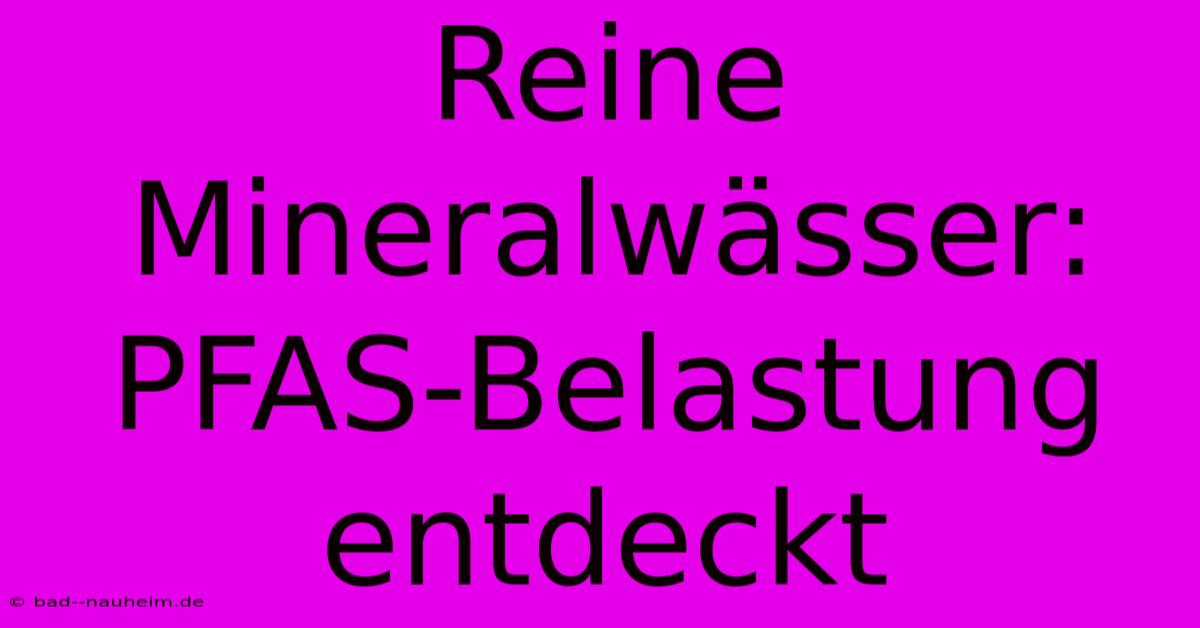Reine Mineralwässer: PFAS-Belastung Entdeckt

Discover more detailed and exciting information on our website. Click the link below to start your adventure: Visit Best Website Reine Mineralwässer: PFAS-Belastung Entdeckt. Don't miss out!
Table of Contents
Reine Mineralwässer: PFAS-Belastung entdeckt – Was bedeutet das für uns?
Hey Leute, let’s talk about something kinda scary that’s been buzzing around lately: PFAS in mineral water. Yeah, I know, not exactly the most exciting topic, but it's important. We all grab that reine Mineralwasser thinking it’s the purest stuff, right? Turns out, maybe not always.
I remember freaking out when I first heard about it. I'm a HUGE fan of sparkling mineral water – I practically bathe in the stuff. So when I saw the news reports about per- and polyfluoroalkyl substances (PFAS) showing up in some brands, I nearly had a heart attack. My carefully curated, healthy lifestyle, poof, gone? It felt like that scene in a movie where the hero finds out their whole world is a lie.
<h3>Was sind PFAS überhaupt?</h3>
Okay, deep breath. First things first: what are these PFAS things? They're a group of man-made chemicals used in tons of products, from non-stick cookware to firefighting foam. The problem? They don't break down easily in the environment, and some studies link them to health problems like liver cancer and immune system issues. Yikes. That’s enough to make you want to stick to tap water, am I right?
My initial reaction was pure panic. I started frantically checking labels, throwing away half my stash of mineral water, feeling like a complete idiot for not paying attention sooner. But then, I calmed down and started doing some research.
<h3>Welche Mineralwässer sind betroffen?</h3>
This is where it gets tricky. Not all mineral water is contaminated, thankfully. The contamination levels vary wildly depending on the source and the bottling process. It’s a real mixed bag. Some smaller, regional brands seem to be doing okay, while some bigger names… well, let's just say I've been a bit more discerning in my choices since then.
I spent ages scrolling through government reports and news articles, trying to make sense of it all. It was a total rabbit hole – way more complex than I ever imagined. I even tried contacting some brands directly – that was a whole other level of frustration – but some were more responsive than others.
<h3>Was kann ich tun?</h3>
So, what have I learned? Well, for starters, stay informed. Keep an eye on the news and government websites for updates on PFAS testing and contamination levels in your region. Secondly, check the labels when possible – although not every label is super clear about the source or testing. Thirdly, consider diversifying your water sources. Don’t rely on just one brand or type of mineral water. Mix it up, you know?
I started switching to filtered tap water more often. I bought a decent filter, and honestly? It tastes pretty good. It’s cheaper, more sustainable, and way less stressful than the constant worry about PFAS levels.
Important Note: I’m not a scientist or expert. This is just my personal experience and the information I’ve gathered. Always consult official sources and health professionals for accurate and up-to-date information on PFAS contamination and its potential health effects. Don't rely solely on my blog post!
This whole thing made me realize how important it is to be a savvy consumer, to ask questions, and to not be afraid to switch brands when necessary. Our health is worth it, guys. Let's stay informed and make smart choices! Any questions, just ask. I’m still learning too.

Thank you for visiting our website wich cover about Reine Mineralwässer: PFAS-Belastung Entdeckt. We hope the information provided has been useful to you. Feel free to contact us if you have any questions or need further assistance. See you next time and dont miss to bookmark.
Featured Posts
-
New York United Healthcare Ceo Ermordet
Dec 04, 2024
-
Stehfest Frau Verlaesst Den Busch
Dec 04, 2024
-
Erfolg Fuer Hc La Chaux De Fonds Liga Ok
Dec 04, 2024
-
Dfb Pokal Aus Freiburg Verliert Gegen Bielefeld
Dec 04, 2024
-
Pokal Sensation Bielefeld Besiegt Freiburg
Dec 04, 2024
